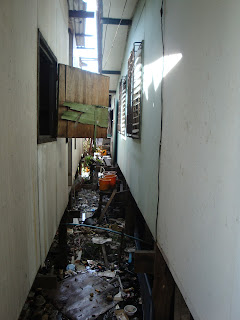Tepheela is an original settlement along the canal within Wangthonlang District. Some of its people have a long history living here some of them migrating from Laos into agricultural land. The settlement is a mix between traditional timber houses and more recent dwellings. One resident, showed us photos of his mother who had lived in the area since its origins:
My impressions of Tepheela during my visit where that it has a very strong sense of place. While walking through the allies we got to see the different livelihood activities of people which are entrenched in the physical characteristics of the settlement.
People have their own way of life here some earning their living from managing a shop, or informal rental schemes for migrants and seasonal workers. One family even has a very innovative transport system used for crossing the canal which functions by moving the boat by cycling!
Informal rental scheme
There was also an old man that seemed to always be peacefully reading in his baranda...
And some ladies showed us their very beautiful houses with gardens and lots of space...
Tepheela is considered one of the most dense settlements within the District lacking basic infrastructure and services such as access roads and garbage collection. However it it is my perception that even when it considered a slum itself it has a variety of residents with different incomes, needs, and expectations of the settlement, which are not necessarily poor.
The problematic we explored in Tepheela relates to its status as an informal settlement with no rights to the land, and the desire of the Crown Poperty Bureau (CPB) (the mayor land owner within the District) to 'upgrade' the settlements through the Baan Mankong Programme. This sounds right no?
However what we encountered was that the CPB is a very powerful actor in this area and despite its long trayectory upgrading informal settlements that occupy their land, some of their approaches are still rigid and do not accomodate the diverse needs of the people in communities.
We were given the task to design a re-blocking exercise for the area ... which basically means re-arranging and demolishing (when necessary) some of the existing houses to make space for new houses and services such as roads and public facilities. This is important for the CPB and the condition to give security of land to the community.
This task was interesting considering this upgrading option has been succesfull in other communities. However this task can only be done with the people that live in the community not without them!!
This created on us some anxiety and it definetely made me think about my role as a urban development practitioner. I realised how easy is to make mistakes when you are in a different context and you don't have access to information and language. We where expecting to be able to work with the community in this exercise... however this was not in the original plan of the CPB.
How do you mediate between the interests of powerfull actors such as the CPB and the communities? Specially considering that is for them that you are doing the work? What I learnt from this situation is that you really need to have strong ethics as part of your work and if things are not going in the direction we think it should go, then we must communicate, negotiate and explored the alternatives.
And so we did... and we had the opportunity to talk to different people in the communities, mainly women, young and old...
From these conversations we found out that there were conflicting views within community members about the re-blocking and any other intervention in the area. People were divided, some of them had started a savings group in order to enter Baan Mankong and others were reluctant to join it as Baan Mankong was not their interest.
Finding out this information was important as it shows that perhaps re-blocking is not the best option to upgrade this settlement and that other options such as in-situ upgrading need to be considered. What is most important is that the community gets together and learn to work collectively as this is the only way they are going to be able to negotiate with such as powerful actors as the CPB about their future and the future of the area...












No comments:
Post a Comment